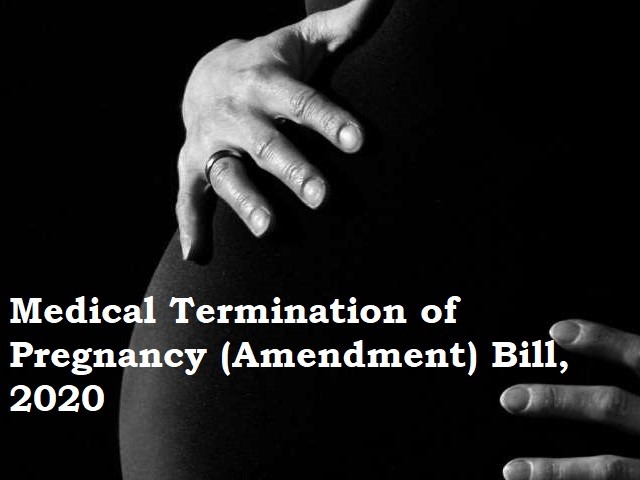MTP Act Rules
Figure 1: No Copyright Infringement Intended
Context:
- The government has notified the new Medical Termination of Pregnancy (Amendment) Rules, 2021 which spell out the situations that define eligibility criteria for termination of pregnancy up to twenty-four weeks as against the previous upper limit of 20 weeks.
About the Amendment in the act:
- The act allows abortion to be done on the advice of one doctor up to 20 weeks, and two doctors in the case of certain categories of women between 20 and 24 weeks.
- The act sets up state level Medical Boards to decide if a pregnancy may be terminated after 24 weeks in cases of substantial foetal abnormalities.
|
Time since conception |
Requirement for terminating pregnancy |
|
|
|
MTP Act , 1971 |
MTP (Amendment) Bill, 2020 |
|
Up to 12 weeks |
Advice of one doctor |
Advice of one doctor |
|
12 to 20 weeks |
Advice of two doctors |
Advice of one doctor |
|
20 to 24 weeks |
Not allowed |
Two doctors for some categories of pregnant women |
|
More than 24 weeks |
Not allowed |
Medical Board in case of substantial foetal abnormality |
|
Any time during the pregnancy |
One doctor, if immediately necessary to save pregnant woman's life |
|
Key Issues with the Bill:
- There are differing opinions with regard to allowing abortions. One opinion is that terminating a pregnancy is the choice of the pregnant woman, and a part of her reproductive rights. The other is that the state has an obligation to protect life, and hence should provide for the protection of the foetus.
- The Bill allows abortion after 24 weeks only in cases where a Medical Board diagnoses substantial foetal abnormalities. This implies that for a case requiring abortion due to rape, that exceeds 24-weeks, the only recourse remains through a Writ Petition.
- The Bill does not specify the categories of women who may terminate pregnancies between 20-24 weeks and leaves it to be prescribed through Rules.
- The Act (and the Bill) require abortion to be performed only by doctors with specialisation in gynaecology or obstetrics. As there is a 75% shortage of such doctors in community health centers in rural areas, pregnant women may continue to find it difficult to access facilities for safe abortions.
- The Bill does not provide a time frame within which the Board must make its decision. Termination of pregnancies is a time sensitive matter, and delays in decision-making by the Medical Board may result in further complications for the pregnant woman.
Philosophy behind the MTP act:
- It divides the whole pregnancy period into three phases.
- Phase 1 is up to 12 weeks where abortion can be sought with the advice of a single medical practitioner. The reason of abortions lies to threat to life for mother as well for child.
- Phase 2 is from 12 to 20 week where abortion can be sought with the advice of two medical practitioners. The reason of abortions lies to threat to life for mother as well for child.
- Beyond 20 weeks, termination may be carried out where it is necessary to save the life of the pregnant woman.
- This act also includes grave incidences like pregnancy arising out of rape or pregnancy arising out of the failure of contraceptives
Supreme Court verdicts on MTP act:
- The Supreme Court has recognised women’s right to make reproductive choices and their decision to abort as a dimension of their personal liberty (in Mrs. X v. Union of India, 2017)
- It has recognized right of women for undertaking reproductive choices falling within the realm of the fundamental right to privacy (in K.S. Puttaswamy v. Union of India, 2017).




1.png)
